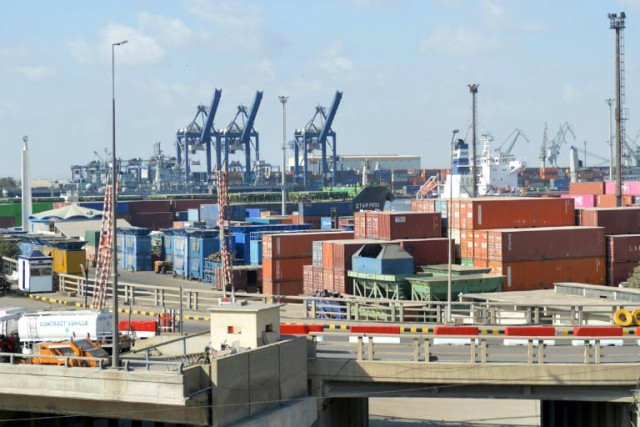Business
Govt moves to cut port delays, speed up clearance | The Express Tribune

ISLAMABAD:
A high-level committee has finalised recommendations to cut container dwell time at Karachi Port and Port Qasim, aiming to improve cargo clearance and reduce congestion at Pakistan’s two key seaports.
According to an official statement, the proposals were presented on Tuesday to Federal Minister for Maritime Affairs Muhammad Junaid Anwar Chaudhry, who directed that the plan be sent to the Federal Board of Revenue (FBR) the same day. He asked FBR to prepare an implementation strategy within two weeks.
The meeting was joined by Acting Karachi Port Trust (KPT) Chairman Rear Admiral Ateequr Rehman and Port Qasim Authority’s (PQA) Director Operations Rear Admiral Muhammad Khalid via video link from Karachi. The committee, chaired by Umer Zafar Sheikh, Additional Secretary at the Ministry of Maritime Affairs, included representatives from KPT, PQA, Pakistan Customs, FBR, and terminal operators.
The minister said the reforms will align Pakistan’s ports with global benchmarks by ensuring faster clearances, smoother trade flows, and lower business costs. He also restructured the committee, giving it the mandate to act as an implementation body, coordinate with FBR, and monitor progress.
The plan addresses delays in goods declaration filing, adjudication, lab testing, transportation, and gate-out processes. Key steps include promoting pre-arrival filing, imposing fines for late submissions, and holding virtual hearings to speed up adjudication. Expanded lab facilities and rapid screening technologies have been recommended to reduce testing delays.
To ease congestion, the committee proposed quicker auctioning of overstayed cargo, expansion of grounding space, and more labour and customs examiners. It suggested round-the-clock customs assessments, examinations, lab work, and shipping services.
Transport improvements include extending bonded transit, simplifying tracker installation, adding escort staff, and lifting night restrictions on heavy vehicles. Infrastructure plans call for truck holding areas, rail freight corridors, and multi-modal transport to reduce road reliance.
The digitalisation push includes AI-based risk profiling of importers, an integrated stakeholder portal within WeBOC, e-auction facilities, and real-time links between terminals, traders, and transporters. The free period for containers under the green and yellow channels will also be reduced from five days to three, with penalties for non-compliance.
Business
UK economy could face ‘very significant’ impact from Iran conflict – OBR

The UK economy could face a “very significant” hit from the conflict in Iran, the official budget watchdog has warned.
The Office for Budget Responsibility (OBR) said that the outlook for inflation would be “particularly uncertain” following spikes in gas and oil prices in recent days following attacks in the Middle East.
It came as the budget watchdog reduced its inflation forecast for this year, indicating that UK inflation will drop to target levels quicker than previously expected.
The OBR also cut its economic growth forecast for this year and revealed a worsening unemployment outlook for the next three years.
In its latest projections alongside the Chancellor’s spring statement, the organisation however highlighted that recent volatility in the Middle East could have an impact on a number of its projections.
The forecasts were prepared before days of recent attacks as part of an intensifying conflict between US-Israeli forces and Iran.
On Tuesday, the OBR said: “Conflict in the Middle East, which escalated as we were finalising this document, could have very significant impacts on the global and UK economies.”
David Miles, from the OBR’s budget responsibility committee, said its predictions that inflation will fall to target levels early this year have become more uncertain after jumps in oil and gas prices linked to recent attacks in the Middle East.
He said: “I think what will happen to inflation is particularly uncertain in the past few days.
“Our central expectation had been that inflation would fall back towards the Bank of England’s 2% target early this year and will be around that level at the end of the year.
“There must be more uncertainty around that right now.”
The trimmed-down inflation projections indicated that this will slow to 2.3% for 2026, down from a previous 2.5% forecast.
Experts said the lower-than-expected rate is partly down to “greater slack in the economy” and falling food and energy prices.
As a result, the OBR indicated that inflation will drop to the 2% target rate set by the Bank of England and the Government later this year.
The Bank has already suggested that inflation – the rate at which the price of goods and services rises – could fall below 2% by April.
The OBR said inflation is expected to remain at the 2% target from 2027 onwards, assuming this is not knocked off course by the potential jump in energy costs.
It came as the Chancellor Rachel Reeves told MPs in Parliament that the OBR said the UK economy would grow more slowly than previously expected in 2026, although growth will pick up in the following years.
UK gross domestic product (GDP) is expected to grow by 1.1% in 2026, as the OBR cut its previous prediction of 1.4% from last November.
The budget watchdog said the downgrade was linked to a growth slowdown late last year, loosening in the labour market and subdued data from recent business surveys.
However, it also lifted its forecasts for growth for both 2027 and 2028, with the economy to expand by 1.6% in both years.
The Chancellor said she had the “right economic plan” for the UK as she laid out her spring statement on Tuesday.
Ms Reeves also said that unemployment is “set to peak later this year” before reducing over the following years.
The OBR said that the UK unemployment rate is on track to peak at about 5.33% in 2026.
Latest data from the Office for National Statistics (ONS) showed that unemployment lifted to a five-year-high of 5.2% in the three months to December.
The OBR had previously predicted that the jobless rate would increase to 4.9% in 2026.
New forecasts show that unemployment is then on track to hit 4.9% in 2027 and 4.4% in 2028.
It had previously forecast it would be 4.6% in 2027 and 4.3% the following year.
The new forecasts have also reduced the Government’s borrowing projections for each year until 2031, in a potential boost for the Chancellor.
Reduced borrowing costs, linked to an easing in the yield on Government bonds, also meant that the Government’s headroom to meet its fiscal rules widened to £23.6 billion, compared with £21.7 billion in November’s budget.
Elliott Jordan-Doak, senior UK economist at Pantheon Macroeconomics, said: “There were few major surprises in today’s spring statement, with the Chancellor delivering the well-flagged ‘boring budget’ that we and the market were expecting.”
He added: “Chunks of the fiscal forecasts now look dated because of the rapid escalation of events in the Middle East.”
Peter Arnold, EY UK chief economist, said: “The underlying improvement in the UK’s fiscal position was supported by higher actual and expected tax receipts, driven in large part by a stronger equity market performance since November.
“There may now be doubts around how long this stock market performance can be sustained if the conflict in the Middle East is prolonged and global equity market volatility continues.”
Business
IMF says ‘too early’ to gauge West Asia conflict impact as energy prices, markets turn volatile – The Times of India

With tensions escalating in West Asia, the International Monetary Fund on Tuesday said it is closely tracking the situation but cautioned that it is “too early to assess the economic impact on the region and the global economy,” as disruptions to trade and energy markets intensify.In a statement, the IMF said it has “observed disruptions to trade and economic activity, surges in energy prices, and volatility in financial markets.”“The situation remains highly fluid and adds to an already uncertain global economic environment,” it said, reported ANI.“It is too early to assess the economic impact on the region and the global economy. That impact will depend on the extent and duration of the conflict,” the IMF added.The remarks come as governments evaluate the fallout of the widening hostilities in the region, particularly on oil supplies and global financial stability.In India, Petroleum and Natural Gas Minister Hardeep Singh Puri earlier said the country is “fully prepared amid evolving situation in the Middle East and energy supplies are robust.”He stated that “the country is well stocked with crude oil and inventories of key petroleum products including petrol, diesel and ATF to deal with short-term disruptions arising from the Middle East.”According to the minister, Indian energy companies have access to supplies that are not routed through the Strait of Hormuz, and such cargoes will remain available to mitigate any temporary disruptions affecting shipments passing through the strait.The Petroleum ministry has also set up a 24×7 Control Room to continuously monitor supply and stock positions of petroleum products across the country.The government is “reasonably comfortable in terms of stocks,” the minister said, adding that safeguarding the interests of Indian consumers remains the highest priority. Based on continuous monitoring, the government is cautiously optimistic that phased measures can be taken, if required, to further mitigate the situation.Government sources said India currently holds about eight weeks of crude oil and petroleum product inventories, including strategic reserves. They added that only about 40 per cent of India’s crude oil imports transit through the Strait of Hormuz, limiting exposure to regional disruptions.Sources maintained that the country remains in a comfortable position on energy security and is closely monitoring developments, while being prepared to manage potential supply-side challenges through adequate inventory levels and diversified sourcing.
Business
Reeves says her plan is working as growth forecast cut for this year

The forecasts were made before the conflict in the Middle East broke out which could have a “very significant” impact, the OBR said.
Source link
-

 Politics6 days ago
Politics6 days agoUS arrests ex-Air Force pilot for ‘training’ Chinese military
-

 Politics5 days ago
Politics5 days agoWhat are Iran’s ballistic missile capabilities?
-

 Business7 days ago
Business7 days agoHouseholds set for lower energy bills amid price cap shake-up
-

 Sports1 week ago
Sports1 week agoTop 50 USMNT players of 2026, ranked by club form: USMNT Player Performance Index returns
-

 Sports6 days ago
Sports6 days agoSri Lanka’s Shanaka says constant criticism has affected players’ mental health
-

 Business7 days ago
Business7 days agoLucid widely misses earnings expectations, forecasts continued EV growth in 2026
-

 Fashion5 days ago
Fashion5 days agoPolicy easing drives Argentina’s garment import surge in 2025
-

 Business5 days ago
Business5 days agoAttock Cement’s acquisition approved | The Express Tribune














